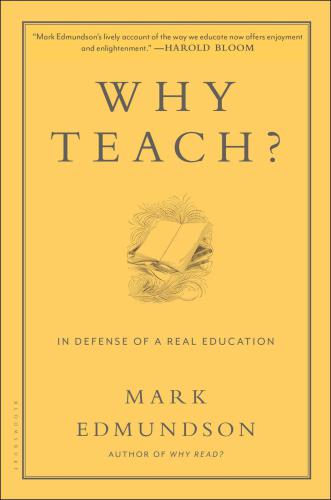
Why Teach?
In Defense of a Real Education
کتاب های مرتبط
- اطلاعات
- نقد و بررسی
- دیدگاه کاربران
نقد و بررسی

June 17, 2013
As he headed to college, Edmundson (Why Read?) told his father that he might pursue a prelaw track. Though he wasn’t sure he wanted to be a lawyer, he figured that lawyers made decent money. His father, he says, “detonated”: “He told me that I was going to college only once, and that while I was there I had better study what I wanted,” which was literature. In this collection of 16 essays, some of which have appeared in Harper’s and the New York Times, University of Virginia English professor Edmundson explores how higher education has devolved into a place where “preprofessionalism is the order of the day”; where the study of literature “has become arid and abstract”; and where universities behave like corporations, teachers like service providers, and students like customers. He offers, at turns, a meditation, a jeremiad, some musings, and some possible solutions. The questions (what to teach? what to study?) find answers in the values Edmundson discovers in becoming an English major: “Love for language, hunger for life, openness and a quest for truth or truths.” Addressing teachers, students, and parents, Edmundson defends the intellectual and spiritual value, even the usefulness, of the “scholarly enclave” and “seeking knowledge so as to make the lives of other human beings better.”

August 1, 2013
Edmundson (English/Univ. of Virginia; The Fine Wisdom and Perfect Teachings of the Kings of Rock and Roll, 2010, etc.) dispels any ambiguity about his position on his subject with the subtitle--"In Defense of a Real Education"--of this deeply felt collection of explorations and reflections on an education in the liberal arts. The author examines the slow transformation of universities and colleges from being driven by intellectual and cultural betterment to institutions modeled on business, with a complex, and not always successful, emphasis on attracting students and making a profit. Success, Edmundson writes, isn't as clear-cut as the bottom line or the percentage increase in applications or even in the rigor of the education being offered. Our culture rewards the system in which the professors tend to their academic business, the students check off the various boxes, and the school support staff build newer, better amenities to ensure that the students feel they are getting the best of the best. Edmundson argues that students have an immeasurably priceless opportunity to take the beliefs that have been instilled in them throughout childhood and put them under a microscope. They have the chance to ensure that they aren't going to simply fit in, as a square peg, to the first matching hole that comes along. "Education is about finding out what form of work for you is close to being play," writes the author--not that it should be simple and without challenge but that doing what you love (and discovering what that might be) is more important than "advancing in the direction of someone else's dreams" and pursuing education as a means to buying your way into what you're acculturated to think equals happiness and success. Edmundson may have strong words about culture, education and the common reader's quest to be entertained above all else, but he provides a bracing tonic against the decline of higher education.
COPYRIGHT(2013) Kirkus Reviews, ALL RIGHTS RESERVED.

July 1, 2013
Readers familiar with the work of author and critic Edmundson (English, Univ. of Virginia; Why Read?; Literature Against Philosophy, Plato to Derrida) will recognize his passionate regard for the liberal arts in this collection of selected essays, many previously published in the Chronicle of Higher Education, Harper's, and the New York Times. Directed at students, parents, and faculty, the essays are imbued with Edmundson's interest in how higher education engages students through their understanding of certain texts so they find their passion and pursue their potential. He warns against the loss of an education of both "heart and mind" and illuminates the tacit and difficult-to-quantify effects of a liberal arts education. VERDICT Edmundson's accessible prose will motivate both students and teachers. Highly recommended for all involved in higher education; an enjoyable and inspiring read.--Jane Scott, George Fox Univ. Lib., Newberg, OR
Copyright 2013 Library Journal, LLC Used with permission.

























دیدگاه کاربران